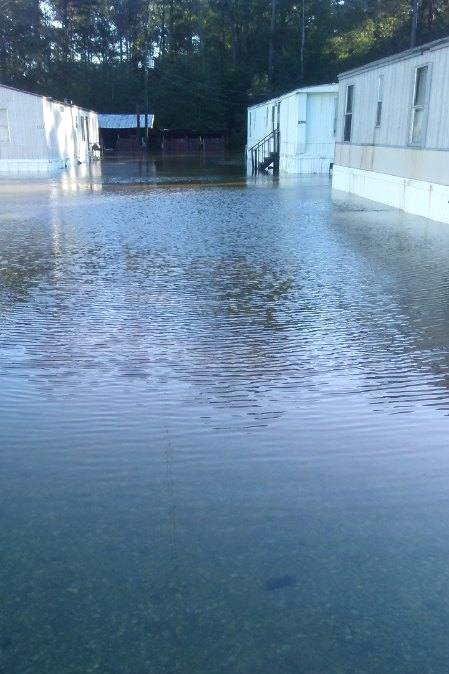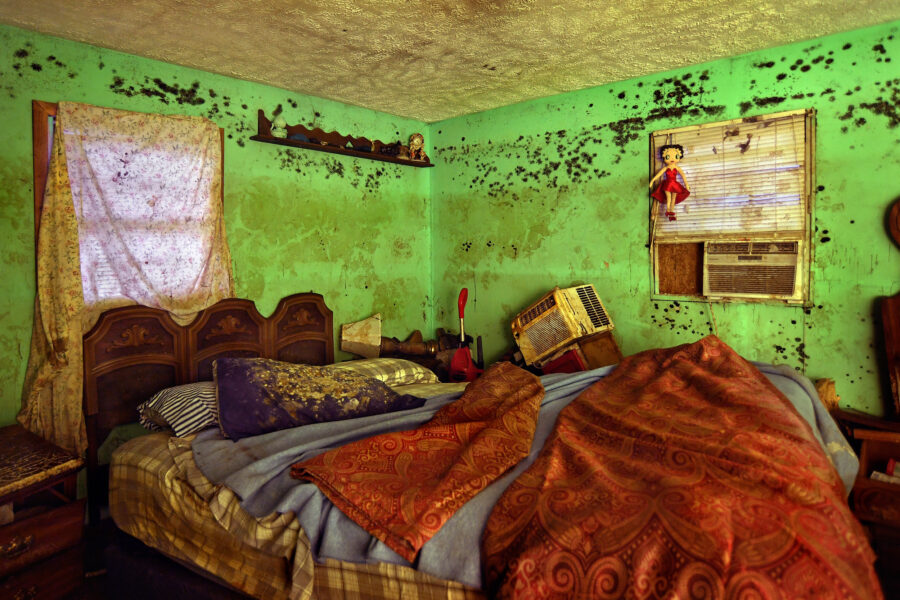ReBuild NC Has a Deficit of Over $150 Million With 1,600 People Still Displaced by Hurricanes Matthew and Florence
Floodwaters barreled up the front steps of Shadina Toudle’s trailer in Kenly, North Carolina, and lapped near her legs.
She had slept through the worst of Hurricane Matthew, a historic 2016 storm that had strafed much of southeastern North Carolina.
But now she was awake. The power had gone out. When she opened the door, the black water and the black night merged into an inky abyss.
As the water rose, she called her friends.
She couldn’t swim.
I’m going to die.
Firefighters were searching the mobile home park by boat. They heard Toudle scream and rescued her.
Explore the latest news about what’s at stake for the climate during this election season.
Toudle and 1,600 other hurricane victims remain in a long line for help as ReBuild NC, the state agency responsible for renovating or rebuilding their homes, runs a deficit in excess of $150 million and seeks to recoup or borrow funds from other agencies, all while keep legislative appropriators in the dark about its financial troubles and growing deficit, according to interviews, internal documents and public emails.
Since 2018, ReBuild NC—its formal name is the N.C. Office of Recovery and Resiliency (NCORR)—has received $779 million in disaster funds from the U.S. Department of Housing and Urban Development to help survivors of Matthew and the hurricane that arrived two years later, Florence. The money has been spread out across more than a half dozen programs. One for homeowner recovery funds the reconstruction or rehab of houses damaged or destroyed by one or both storms—like Toudle’s mobile home.
More than 2,700 applicants are back in their homes or have received reimbursements from ReBuild NC to hire their own contractors, according to agency figures dated Oct. 2. Another 4,000 have withdrawn—voluntarily or involuntarily—from the program. But the 1,600 awaiting assistance have left the agency scrambling for a solution.
ReBuild NC officials did not answer direct questions about the finances but instead provided a statement. An agency spokesperson attributed the shortfall to “fluctuating construction costs” and the accelerated pace of homebuilding.
In fairness to state officials, federal funds were slow to arrive. Congress did not appropriate disaster relief money for Matthew until 2018. After Hurricane Florence ravaged the state in September of that year, Congress took nearly two years before sending aid.
More than $649 million has been budgeted for Homeowner Recovery, according to ReBuild NC figures. Yet even after moving funds among its disaster recovery and resiliency programs, ReBuild NC still needs $75 million to cover costs for all current applicants, documents show.
The agency estimates that the final budget for Homeowner Recovery for Hurricanes Matthew and Florence could be as much as $820 million. That’s nearly double the original amount when the programs were established, according to HUD documents.
It’s unclear how the agency will make up for the shortfall of more than $150 million. Emails and documents reveal that ReBuild NC Director Laura Hogshead unsuccessfully petitioned the State Pandemic Recovery Office for $20 million. She has asked the N.C. Housing Finance Agency to return a $111 million grant it received from ReBuild NC to provide rental assistance for low-income people, but NCHFA needs those funds to serve its clients.
Yet that’s only part of the financial picture.
Other factors, both within and outside ReBuild NC’s control, have contributed to the cash crunch. Those include extensive delays by building contractors and county permitting offices, the agency’s own systemic inefficiencies and the cost of temporary housing for hurricane survivors—now at $71.7 million.
Because ReBuild NC didn’t close the application period for the Homeowner Recovery Program until April 2023, there was an “oversubscription for assistance,” agency documents show—too many people and not enough funds to help them.
Earlier this month, the state Legislature appropriated $273 million for Hurricane Helene relief, aimed at western counties devastated by the storm. But those funds are limited only to Helene and can’t be spent on previous disasters.
When Congress appropriates federal disaster recovery funds for Hurricane Helene, which it’s expected to do after the election, hundreds of millions of dollars could flow to ReBuild NC. Because of Helene’s vast destruction, and the challenges presented by western North Carolina’s mountainous terrain, Helene will be a more complicated and protracted recovery. It’s unclear how an agency with a history of financial and logistical mismanagement would handle it.
Months before Helene, Republican U.S. Sen. Thom Tillis of North Carolina in May sent a letter to Hogshead, asking the director questions about the program. In 2019, Tillis had introduced legislation to expedite disaster funding for states and local communities.
“As North Carolina heads into hurricane season, I am concerned this may jeopardize future recovery efforts should another devastating storm occur,” Tillis wrote. “Thousands of individuals and families in North Carolina still await solutions years after Congress appropriated federal funding. We can all agree that they should not have to wait this long to be made whole again.”
There is no more money for Matthew and Florence disaster recovery. All the funds are spoken for, a ReBuild NC spokesperson said.
Jordan Monaghan, a spokesperson for Democratic Gov. Roy Cooper’s office, didn’t answer direct questions about the governor’s knowledge of ReBuild NC’s finances. Instead, Monaghan provided a statement: “The Governor expects Rebuild NC to continue to complete construction projects and help families return home. … The Governor has instructed them to assess outstanding needs for applicants and present additional funding requests for state and federal appropriators. We expect that to be done in coming days.”
Toudle is among those applicants.

She is 34 years old, short, with large brown eyes and black braids woven tight to her head. A small silver ring sparkles from her nose. She is a woman of faith; without God, she does not believe she would have survived homelessness and two hurricanes.
“God has blessed me,” she said.
She and her nieces and nephews lived in a small mobile home park at 622 Lincoln Drive, in Kenly. Her lot—Lot D—was in the back, the last trailer along a sandy driveway that backed up to a canal. In 2010 she had cobbled together $6,500 to buy the trailer, a single-wide built before she was born. She paid the $125 monthly lot rent a year in advance.
Although Hurricane Matthew damaged the trailer, Toudle continued to live there, even as mold bloomed on the walls. In 2016, Toudle applied to ReBuild NC for help in securing a new house related to the damage from Matthew. The agency lost her paperwork, she says, and she had to reapply.
Then two years later, in September 2018, Hurricane Florence hit, blowing out the trailer windows.
Within two years, the remnants of a third storm flooded the trailer. She hoisted her four nieces and nephews, all under the age of 8, on the roof, went back inside to retrieve their shoes and her cat, and scrambled up herself. I have to get the babies out of here.
Finally, Toudle’s cousin who lived nearby swam over and rescued them.
Toudle and the children returned to the trailer after the floodwaters receded. But soon, the floors caved in. She woke up one morning to find a possum sitting on the stove. The mold flourished. Sewage backed up into the sink. Because social services officials deemed the housing situation unstable, the children had to move to foster care. Toudle’s doctor told her she had to leave her home because the mold was making her sick.
In March 2021, ReBuild NC moved her into an extended stay motel in Goldsboro, where she lived until this past June.
She was pregnant, and contractors had yet to break ground on her house. She moved in with her mother, unsure which would arrive first, her baby or her home.
For Toudle, a Catch-22
Like many mobile home owners, Toudle faced a problem unique to those who rent their lot. They are at the mercy of the mobile home park owners. After Florence, the owner of Toudle’s park died. His children didn’t want to be in the property management business, so they sold the land.
Even if she had a new trailer, Toudle couldn’t move back to her lot. And without a lot, ReBuild NC could not help her get a new home.

Toudle said that ReBuild NC told her if she found land, they could replace her mobile home, a value of about $60,000. She had been living in a motel for about a year, when in 2022, she found a lot in Selma, in Johnston County. Toudle paid $300 for the first month’s rent. She paid for the second month, and then a third, but ReBuild NC still hadn’t delivered the trailer. After putting down $900, she lost the lot, and a subsequent one in Goldsboro.
Meanwhile, Toudle stayed in a motel and her belongings remained in her damaged trailer. But she didn’t have access to a truck, and after months of waiting, the property owners destroyed the home with everything inside.
“When I saw my trailer on the ground I cried,” Toudle said this summer as she sat in the front seat of her car with the air conditioner blowing. “A brand-new sofa, washer and dryer, TV. I had my grandma’s ashes, pictures of my grandma, valuable stuff my grandma made. I lost everything.”
Toudle languished in a motel room for a second year, as did thousands of other displaced hurricane survivors. At the time, ReBuild NC was building only about 10 to 15 homes a month; at that rate, it would take a decade to get everyone back home.
“When I saw my trailer on the ground I cried … I lost everything.”
— Shadina Toudle
Under scrutiny from the Legislature and the governor’s office, ReBuild NC quickened the pace of home construction and rehabs to 116 per month–a historic high, according to an agency spokesperson. ReBuild NC is incurring $20 million to $25 million a month in construction costs, contributing to the shortfall. But even with program improvements, years of mismanagement have caught up with the agency.
In Early 2024, Troubling Signs Emerged
ReBuild NC’s cash flow problems can be traced back to at least January of this year, according to emails obtained by Inside Climate News under public records law.
The agency requested a $5.4 million loan from the State Disaster Relief Fund to pay outstanding invoices to general contractors, according to a letter from ReBuild NC Chief Finance Officer Jim Klingler dated Jan. 9.
The State Disaster Relief Fund is managed by the N.C. Department of Public Safety.
ReBuild NC needed the loan because general contractors had not been paid in more than a month from Homeowner Recovery Program funds. The agency was waiting for HUD officials to approve a withdrawal from its line of credit.
Klingler attributed the payment delays to the glitches in the North Carolina Finance System, a statewide cash management program. But after three months of delays, general contractors were growing displeased.
“The mood among our general contractors has resulted in some threatening to pull their crews from our projects until they receive payment,” Klingler wrote. “Worse still, ReBuild NC is concerned that key general contractors may determine that more reliable revenue could be had outside of North Carolina. Hence, the urgency of this request.”
The Office of State Budget and Management approved the loan, which ReBuild NC then repaid with HUD funds. However, OSBM cautioned that future requests would require another approval and prompt a “deeper dive into operational and procedural matters” to ensure that DPS and ReBuild NC were not relying on these loans to run their agencies.
Even with the loan, though, on Jan. 16, Klingler projected that ReBuild NC was $440,000 in the hole for the Homeowner Recovery Program, documents show.

Then on Jan. 24, Hogshead, ReBuild NC’s director, and Chief Recovery Officer Matt Arlyn unsuccessfully tried to tap into money overseen by the Office of State Budget and Management to cover temporary housing costs for hurricane survivors who were still displaced.
The proposal included siphoning off pandemic-related federal housing funds, American Rescue Plan dollars and Hurricane Florence money that had been appropriated by the Legislature to various state agencies.
ReBuild NC couldn’t get at any of it. In some instances, it would have required the Legislature to reappropriate the money, emails show. And after conferring with the U.S. Treasury, OSBM confirmed that pandemic dollars were intended only for renters and could not legally be used to assist people in the Homeowner Recovery Program.
On Jan. 31, Klingler, the agency’s chief finance officer, resigned. He now works for ICF, a disaster management consultant that contracts with ReBuild NC.
Over the past 10 months, ReBuild NC has bounced money between disaster recovery programs, with HUD approval. While it’s common for agencies to periodically assess the needs of their programs, the extent of ReBuild’s reallocations points to a budget problem, records and interviews indicate.
Since 2021, ReBuild NC has gutted the budget for the Strategic Buyout Program, a key component of moving people out of flood-prone areas and harm’s way. The agency also canceled programs for Public Housing Restoration, Infrastructure Recovery and Small Rental Repair, HUD documents show.
As of Oct. 2, public records show the agency had moved an additional $30 million from other programs to Homeowner Recovery, according to HUD reports. All of the money came from the Affordable Housing Recovery Fund in two installments of $14.99 million and $14.92 million each, just eight days apart. Those figures are important; only reallocations of $15 million or more require public notification and comment.
After two and a half years in a motel, Toudle finally got some relief. In September 2023, ReBuilding Broken Places, a nonprofit organization in Goldsboro, donated a quarter-acre lot in Faith Estates, a subdivision of 10 modest homes along a cul-de-sac on the city’s north side. Charles Wright, a military veteran who helps hurricane survivors navigate government bureaucracy, presented Toudle with the deed to the land.
Toudle had experienced so many misfortunes and broken promises, she initially thought it was a scam. Wright reassured her that yes, she owned the lot. Now she could get a home.
Toudle was upgraded to a single-family house because the neighborhood doesn’t allow mobile homes. Yet nearly a year later, not a single shovel of dirt had been turned. In addition to inexplicable contractor delays, the major sticking point was the size of the home.
As part of its project management system, ReBuild NC typically awarded the floor plans before the land was surveyed. As a result, in dozens of cases, the selected home didn’t fit on the lot or comply with local setback regulations.
These glitches caused further delays while homeowners selected new floor plans or the counties deliberated whether to issue a variance. Further delays translated to higher construction costs as the price of materials increased, and more funds were diverted to temporary housing assistance.
Toudle’s home was 10 feet too deep. It was August, and her baby, a girl, was due in three months.
A Baby and a Home?
To pay its bills, ReBuild is eyeing one of the largest chunks of money—$111 million—that is sitting at the N.C. Housing Finance Agency, documents show. NCHFA is a public entity that finances affordable houses and apartments for low-income people, and provides loans for repairing substandard homes. It has received funding from ReBuild NC for rental housing developments in areas hit by Hurricanes Matthew and Florence.
For ReBuild NC to take back that $111 million, it needs NCHFA’s cooperation and HUD’s approval.
However, no such deal has been finalized, said NCHFA spokesperson Connie Helmlinger. “While we have been in ongoing conversations with [ReBuild NC] on their proposal regarding the potential return of funding … at this time there has been no agreement to move or replace those funds.”
If NCHFA eventually returns the money, that won’t solve ReBuild NC’s financial problem.
The agency could lobby the Legislature for more funds, which would draw further scrutiny to its operations.
Two years ago, lawmakers convened a special oversight committee to probe ReBuild NC’s management practices. It held three public hearings but has not met about disaster relief in more than a year and a half.
Three state lawmakers on the oversight committee told Inside Climate News that they had been focused on ensuring disaster survivors could return home and were unaware of ReBuild NC’s financial straits.
ReBuild NC does provide weekly data to the committee, including the number of homes completed and in progress, as well as basic financial figures. However, these reports lack details that would indicate financial distress.
Pryor Gibson is a senior advisor to the governor who was dispatched in January to help ReBuild NC stay on track. “My goal is for the General Assembly to ignore you for 100 days,” Gibson wrote in a text message to Hogshead in April. “And pray for no mid-Atlantic storm.”
In late September, Shadina Toudle visited her land in Goldsboro. She shuffled out of the car, her pregnant belly leading the way. Toudle had been in and out of the hospital to keep from having her baby prematurely. The baby had big shoulders, doctors had told her, and if she could just make it a few more weeks, she would return on Oct. 22 for a cesarean section.
Contractors had figured out a way to wedge the over-sized house onto the lot. They had installed a silt fence, taken down a tree and prepared the land to begin building the foundation. But it was clear there was too much work still to do. The baby would arrive before the house.
On Oct. 9, Everleighia Toudle was born without the need for a cesarean. Eight pounds, eight ounces and 18 inches long. Toudle knows a motel is no place for a newborn, so they’ll stay with family until the home is done. It could be December; it could be January. Toudle hopes that it’s soon.
About This Story
Perhaps you noticed: This story, like all the news we publish, is free to read. That’s because Inside Climate News is a 501c3 nonprofit organization. We do not charge a subscription fee, lock our news behind a paywall, or clutter our website with ads. We make our news on climate and the environment freely available to you and anyone who wants it.
That’s not all. We also share our news for free with scores of other media organizations around the country. Many of them can’t afford to do environmental journalism of their own. We’ve built bureaus from coast to coast to report local stories, collaborate with local newsrooms and co-publish articles so that this vital work is shared as widely as possible.
Two of us launched ICN in 2007. Six years later we earned a Pulitzer Prize for National Reporting, and now we run the oldest and largest dedicated climate newsroom in the nation. We tell the story in all its complexity. We hold polluters accountable. We expose environmental injustice. We debunk misinformation. We scrutinize solutions and inspire action.
Donations from readers like you fund every aspect of what we do. If you don’t already, will you support our ongoing work, our reporting on the biggest crisis facing our planet, and help us reach even more readers in more places?
Please take a moment to make a tax-deductible donation. Every one of them makes a difference.
Thank you,
David Sassoon
Founder and Publisher
Vernon Loeb
Executive Editor
Share this article
- Republish
Disclaimer: The copyright of this article belongs to the original author. Reposting this article is solely for the purpose of information dissemination and does not constitute any investment advice. If there is any infringement, please contact us immediately. We will make corrections or deletions as necessary. Thank you.
Title:ReBuild NC Has a Deficit of Over $150 Million With 1,600 People Still Displaced by Hurricanes Matthew and Florence
Url:https://www.investsfocus.com










